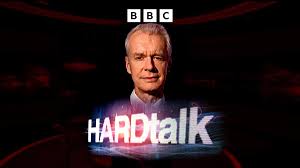BBC Ditches Hardtalk: Because Thinking Is So 1997
Strictly Come Dancing to be serialised on BBC News
10/15/20244 min read


The BBC has done it again. In what must surely be the latest episode of its long-running series How to Dumb Down a Nation, the venerable institution has decided to axe Hardtalk. Yes, Hardtalk—that inconvenient show where famous people and politicians had the nerve to be grilled with hard-hitting questions instead of being asked about their favourite biscuit.
Apparently, the great minds in the BBC boardroom have decreed that the public can’t handle tough conversations anymore. Perhaps they think we’re all too busy watching Strictly Come Dancing or being mesmerised by some slow-motion footage of a bee landing on a daffodil in the latest wildlife epic. Or, maybe, in their infinite wisdom, they decided that any show requiring viewers to actually use their brains is a relic from a bygone era—like the fax machine, vinyl records, or politicians with a shred of dignity.
But let’s not be too harsh. I’m sure there was a perfectly sound reasoning behind this decision. After all, why would the British public want to watch Hardtalk when they can enjoy the intellectual delights of The One Show, where the toughest question ever asked was, “What was it like to work with a hedgehog on that new children’s film?” Far be it from us to want a deep-dive interview with a world leader or a global icon about, say, war crimes or human rights abuses. No, no—bring on the quirky segment about a pensioner who knits scarves for pigeons in Barnsley instead.
Let’s face it, Hardtalk had it coming. It was far too demanding. Imagine the horror of having to sit through a 30-minute interview where Stephen Sackur or Tim Sebastian relentlessly pressed some squirming politician, refusing to let them wriggle off the hook with their usual non-answers. No, much better to let them glide through an appearance on Good Morning Britain, where the hardest thing they’ll be asked is whether they prefer tea or coffee in the morning.
The truth is, the BBC has been moving away from anything remotely challenging for a while now. Hardtalk was like the last bloke standing at a party, still sober and trying to have a serious conversation while everyone else is in the corner downing Jägerbombs and playing Candy Crush. And as we all know, nobody likes the guy who reminds you that there are more important things in the world than whatever celebrity gossip is trending on Twitter.
But if we’re being honest, Hardtalk’s fate was sealed the minute it became clear that the BBC was allergic to anything that smelled vaguely of controversy. Somewhere deep in the heart of Broadcasting House, there’s a button marked “Dangerous Intellectual Content,” and they’ve smashed it to bits. After all, who needs in-depth analysis when you can commission yet another series about British celebrities trying to bake, dance, or survive in the wilderness for a week?
You can almost imagine the conversation in the BBC boardroom:
Executive 1: “We’ve got an idea for a new show. It’s an in-depth look at climate change, and we’ve lined up some of the world’s top scientists for interviews.” Executive 2: “Hmm... Can we get Mary Berry to present it? Maybe she could bake a cake shaped like the melting polar ice caps?” Executive 1: “Erm, I suppose…” Executive 2: “Fantastic! Green light it. Oh, and by the way, cancel Hardtalk. Nobody wants to think that much.”
And so, Hardtalk joins the long list of BBC programmes that have been unceremoniously dumped for the crime of asking too much of the audience. You see, asking viewers to engage with complex subjects like geopolitics, human rights, or economic crises is just too much in 2024. Apparently, our poor, addled brains can’t cope with anything more taxing than a round of Pointless.
It's a bit rich, though, isn’t it? The BBC, supposedly the bastion of public service broadcasting, deciding that what the public really needs is less service. A show like Hardtalk was exactly the kind of thing the BBC was supposed to do: hold people in power to account, ask uncomfortable questions, and explore the grey areas that mainstream media often glosses over. But no, that’s all far too tricky. Far better to make something that doesn’t make anyone feel bad, doesn’t require too much attention, and certainly doesn’t leave anyone with any pesky follow-up thoughts after the credits roll.
But don’t worry. The BBC will surely replace Hardtalk with something that’s exactly what the nation needs right now. Maybe they’ll put on a new show where celebrities discuss their “spiritual journeys” while painting each other’s toenails. Or how about a panel show where comedians guess which outlandish conspiracy theory is real? After all, if you can’t beat the nonsense, you might as well join it.
So, RIP Hardtalk. You were too serious, too important, and far too brainy for these times. The BBC, in its infinite wisdom, has decided that you—and by extension, the viewers—should take a break from all that “thinking” nonsense. After all, who needs robust journalism when we can have another hour of mindless entertainment?
It’s fine. We’ll just sit here, blank-faced, waiting for the next novelty game show to arrive. Because, clearly, the BBC has concluded that the real problem with the British public is that we’ve been thinking far too much.
